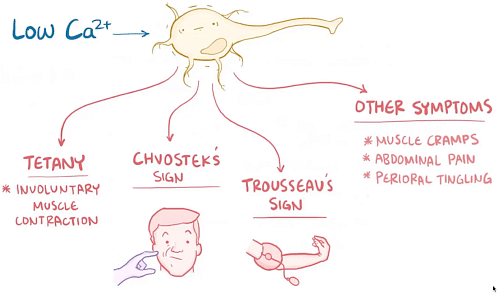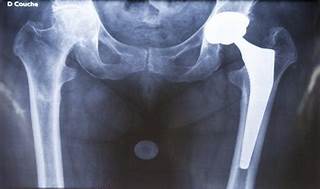A nurse is collecting data from a patient who has hypocalcemia. Which of the following findings should the nurse expect?
Hypoactive bowel sounds
Tingling of the lips
Decreased deep tendon reflexes
Skeletal muscle weakness
The Correct Answer is B
Choice A reason: Hypoactive bowel sounds are not typically associated with hypocalcemia.
Choice B reason: Tingling of the lips, also known as paresthesia, is a common symptom of hypocalcemia due to the effect of low calcium levels on nerve function.
Choice C reason: Decreased deep tendon reflexes are more commonly associated with hypercalcemia, not hypocalcemia.
Choice D reason: Skeletal muscle weakness can be a symptom of severe hypocalcemia, but tingling of the lips is a more immediate and common finding.
 |
Nursing Test Bank
Naxlex Comprehensive Predictor Exams
Related Questions
Correct Answer is D
Explanation
Choice A reason: Keeping the bathroom door open does not address the safety risk of the patient bearing weight on the operative foot.
Choice B reason: While it is important to assist the patient back to bed, providing a bedpan does not address the immediate safety concern.
Choice C reason: Warning the patient about restraints is not appropriate without first educating the patient about the importance of not bearing weight and the potential risks.
Choice D reason: Telling the patient to remain in the bathroom until a wheelchair can be obtained ensures the patient's safety and prevents further weight-bearing on the operative foot.
Correct Answer is B
Explanation
Choice A reason: While bed rest may be required immediately after surgery, patients are typically encouraged to mobilize as soon as possible to prevent complications.
Choice B reason: Using a special soap the evening before surgery is a common preoperative instruction to reduce the risk of infection.
Choice C reason: A CPM machine is often used after hip replacement surgery to promote movement and prevent joint stiffness.
Choice D reason: A heating pad is generally not recommended on the operative site immediately after surgery due to the risk of burns and bleeding.
|
The correct answer is choice B. “You will use a special soap to shower with the evening before your surgery.” Choice A rationale: Remaining in bed for at least the first 24 hours is not typically recommended. Early mobilization is encouraged to prevent complications such as blood clots and to promote faster recovery. Choice B rationale: Using a special soap to shower with the evening before surgery is a common preoperative instruction. This helps reduce the risk of infection by decreasing the number of bacteria on the skin. Choice C rationale: Continuous passive motion (CPM) machines are generally used for knee replacement surgeries, not hip replacements. They help in maintaining joint mobility and preventing stiffness, but are not standard for hip surgeries. Choice D rationale: Using a heating pad on the operative site is not recommended as it can increase swelling and the risk of burns. Cold therapy is usually preferred to reduce pain and inflammation postoperatively. |
|
Whether you are a student looking to ace your exams or a practicing nurse seeking to enhance your expertise , our nursing education contents will empower you with the confidence and competence to make a difference in the lives of patients and become a respected leader in the healthcare field.
Visit Naxlex, invest in your future and unlock endless possibilities with our unparalleled nursing education contents today
Report Wrong Answer on the Current Question
Do you disagree with the answer? If yes, what is your expected answer? Explain.
Kindly be descriptive with the issue you are facing.

